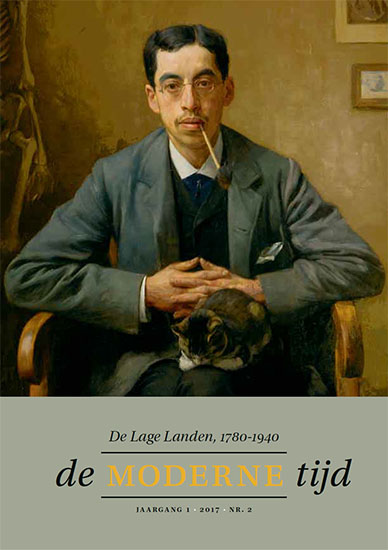Sandra van Voorst en Janneke WeijermarsInleiding 114-117
Mathijs SandersEen uurtje met Dirk Coster. De self-fashioning van een informant 118-133
Abstract (EN)
An hour with Dirk Coster. The self-fashioning of a literary informant.In 1927, the French literary magazine La Nouvelle Littéraire published an interview with the Dutch writer Dirk Coster by the renowned critic Frédéric Lefèvre in the series ‘Une heure avec …’. Coster used the opportunity to present himself as an international cultural mediator and as a spokesman of a humanistic conception of literature. This article analyses the interview by focussing on the way Coster was portrayed in front of a French audience and by interpreting his statements concerning both Dutch and French literature.
Leonieke Vermeer‘Waarom eigenlijk kruisjes in plaats van pollutie?’ Het dagboek (1901-1941) van Leo Polak in relatie tot het discours tegen masturbatie 134-159
Abstract (EN)
‘Why crosses instead of pollution?’ The diary of Leo Polak (1901-1941) and the discourse against masturbation.The diary of the Dutch criminal law theorist, philosopher, and freethinker Leo Polak, which recently has become accessible, contains symbols such as ‘X’ and ‘#’. In this article, I interpret such symbols not as ‘silence’, but as disguising, narrative strategies. These symbols and the way Polak reflects on them, can be connected to the discourse on masturbation as a ‘total illness’, which developed from the beginning of the eightteenth century to the 1930s. The symbols in Polak’s early diaries indicate that diary writing functioned as a medium to register and control his solitary sexual activity. The diaries show the anti-masturbation discourse; the experience of it, the struggle with it and ways to resist it. Later in life, he used these experiences in his work on Sexual ethics (1936) in which he rejects the medical and religious views on masturbation and makes a plea for the autonomy of the human mind and body.
Anne van BuulBeeldessay‘Een eerbiedwaardig reuzenwerk’. De Geïllustreerde Bijbel (1900) 160-180
Abstract (EN)
‘A venerable, giant piece of work’. The Illustrated Bible (1900).De Geïllustreerde Bijbel (The Illustrated Bible, 1900) is a Dutch Bible edition, initiated by the Illustrated Bible Society, containing 100 engravings by 27 artists from all over the world and decorated by Arts and Crafts artist Walter Crane. This essay shows the history of this bible project. It discusses the aims of the Illustrated Bible Society, the reception of the edition, its illustrations and decorations, and it shows how difficult it was to make such an expensive, time-consuming project successful.
Erica van Boven‘Hier is een man aan het woord’. Genderbeelden bij Tachtig 181-203
Abstract (EN)
‘This is a man speaking’. The use of gender metaphors in the Movement of the 1880’s.This article deals with the role of gender in the poetics and literary strategy within the so-called Movement of the 1880s (De Tachtigers). The analysis of the use of gendered metaphors in the writings of Willem Kloos, Lodewijk van Deyssel, Frans Netscher and Albert Verwey between 1882 and 1889 demonstrates that gender plays a specific and remarkable role in the way these young authors express their views and fight for their position.
Gillis Dorleijn‘Was hätten Verse von dieser Dezenz zu fürchten’. Over homoseksualiteit en poëzie 204-226
Abstract (EN)
‘Was hätten Verse von dieser Dezenz zu fürchten’. On homosexuality and poetry.Concepts of homosexuality circulate in the societal domain and affect literary culture. The first half of the twentieth century saw an increasing domestication of the public domain regarding homosexual practices. Using three perspectives – text, authorial posture, and reception – and focussing on a specific case, a volume of apparently homo-erotic poetry, this article identifies all kinds of tensions: poems touching on homo-erotic subjects while simultaneously covering them up by complex poetic devices; the poet’s posture invoking homo-erotic icons, yet refusing to be outspoken; a progressive critic reading the volume and struggling to reconcile extra-literary and literary norms.
Boekzaal der geleerde wereld 227-232
- Marjet Brolsma, ‘Het humanitaire moment’. Nederlandse intellectuelen, de Eerste Wereldoorlog en het verlangen naar een regeneratie van de Europese cultuur (1914-1930). Hilversum: Uitgeverij Verloren, 2016. (Marlite Halbertsma)
- Jeroen Kapelle (samenstelling), Bezield landschap. Leven en werk van Johannes Warnardus Bilders (1811-1890). Wageningen: Uitgeverij Blauwdruk, 2016. (Wiepke Loos)
- Terry van Druten, Annemieke Hoogenboom, Jeroen Kapelle e.a., Jan Weissenbruch. Bussum: Toth, 2016. (Wiepke Loos)

